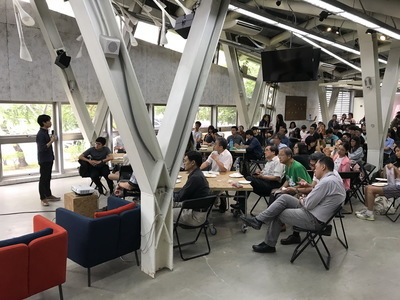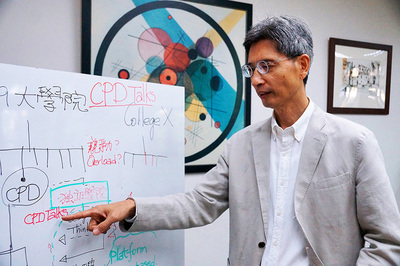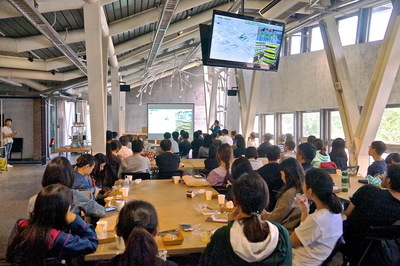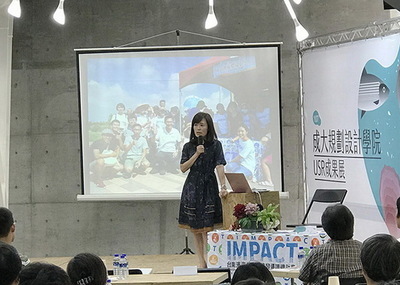Revolutionizing Orthodix Teaching and Returning Universities to Their Roots FREE Lunch, FREE Talks for Our Future




At C-HUB from 12:00 PM to 1:00 PM every Tuesday from October to the end of December this year, the College of Planning and Design at NCKU has been holding a series of cross-disciplinary forums called CPD Talks: Synergy for the Future. The subjects of these talks focus on four issues, namely, technology, sustainability, education, and innovation, and the talks are being jointly planned and executed by the Department of Industrial Design, the Department of Architecture, the Department of Urban Planning, and the Institute of Creative Industries Design. The primary organizer behind the talks, Dean Tay-Sheng Jeng of the College of Planning and Design, is fulfilling a wish that he has had for 18 years: to introduce the culture of cross-disciplinary exchange from overseas to the College of Planning and Design at NCKU, offer the latest knowledge and technology that cannot be learned in the classroom, eradicate old practices, and return universities to their roots. NCKU president Jenny Huey-Jen Jenny Su, who wholeheartedly supports this project, stated that they will promote the spirit and methods to other colleges in NCKU so that teachers and students will be able to engage in cross-disciplinary learning in an atmosphere of unlimited exchange.
T he name of the talks conveys the hope that participants will be able to vocalize innovative ideas that will benefit the future through discussion and argument. Dean Tay-Sheng Jeng indicated that a college is the window between university and departments as well as the link between departments and stressed that its responsibility is to gather cross-disciplinary impacts. The College of Planning and Design comprises three departments and one institute, which began to unify with CPD Talks. They have surpassed their independent operations in the past and co-created a platform for sharing.
CPD Talks began in October with Vice Dean Min-Yuan Ma of the College of Planning and Design, sharing his experiences with Stanford d-school. In November, Dean Lin-Lin Chen from Eindhoven University in the Netherlands and three foreign students from NCKU’s Department of Architecture were invited to host cross-disciplinary exchanges. Each talk offered free lunch, and Dean Tay-Sheng Jeng stressed with joy that they have been providing an average of 100 free lunches to attending teachers and students every week, so attendance has been good.
Assistant professor Ing-Tse Chen has attended three weeks in a row and greatly approves of the talks. “It’s great to be able to have such an exchange platform. The few times I attended all felt pretty good. With the CPD Talks, teachers have regular opportunities to meet and learn together in their busy schedules, and it also deals with their need to eat on campus.” Ing-Tse Chen said that during the talks, she learned about the off-campus implementation strategies of the USR project, the blueprint plans for the Shalun Smart Green Energy Science City in Tainan, and the achievements and prospects of the Ministry of Science and Technology’s Cross-Field Value-Adding program. She also had the opportunity to meet teachers from other departments and build connections during lunch, so each talk has been a major gain for her.
Students have also been actively participating in the talks. Gao-hua Liu, a student at the Department of Industrial Design who has attended every week, said that the experiences shared by Professor Ma on d-school left a deep impression on him and that participating in the talks has given him an understanding of projects in similar fields. Department of Industrial Design Nei-Wen Chang said, “I will continue to recommend it to my friends because of the free lunch.” Department of Urban Planning student Hsuan-Ho Yu noted, “It takes place during lunch time, so other things are less likely to get in the way.” Students are free to gather at C-HUB and have the opportunity to listen to the experiences shared by talkers, gain new knowledge, or interact with one another.
While free lunch may seem like the main attraction of the talks, it also played a role in the origin of the talks. Dean Tay-Sheng Jeng recalls the impact of the first Brown Bag Lecture that he attended while studying at the Georgia Institute of Technology in the US in 1996 and still vividly remembers listening to the lecture with a brown bag lunch in his hands. Each week, the lecture venue offered a spectacular Buffet. Everyone was free to come and go, and it was completely free. “Enjoying a feast while learning about future technology was a major shock for a student studying abroad and makes you realize that there really is such a thing as free lunch!”
Tay-Sheng Jeng emphasized, “In the era of innovation, I hope to introduce the culture of cross-disciplinary exchange from overseas to the College of Planning and Design at NCKU, offer the latest knowledge and technology that cannot be learned in the classroom, eradicate old practices, and return universities to their roots.” Universities should be a place of knowledge integration, sharing, and exchange and where different opinions are aired. In this way, students and teachers can use their differences to train their critical thinking. However, most projects in the academia operate top-down with tasks being assigned, which leaves little room for independent thinking and new opportunities. Contrary to the standard, the CPD Talks held by the College of Planning and Design goes bottom-up and breaks with conventions. Teachers from various departments have free rein. They can seek topics they are interested in and autonomously create a platform that facilitates exchange, cooperation, and even f usion.
As for the actual achievements of the talks, Dean Tay-Sheng Jeng is keeping an open mind. He also plans to organize Pecha Kucha events and even national policy debate competitions. He stated, “Our most important objective is to make the participants really feel that education and learning is Free. We want them to form deep impressions during the talks. Maybe even something they inadvertently hear could change the way they think.”
T he name of the talks conveys the hope that participants will be able to vocalize innovative ideas that will benefit the future through discussion and argument. Dean Tay-Sheng Jeng indicated that a college is the window between university and departments as well as the link between departments and stressed that its responsibility is to gather cross-disciplinary impacts. The College of Planning and Design comprises three departments and one institute, which began to unify with CPD Talks. They have surpassed their independent operations in the past and co-created a platform for sharing.
CPD Talks began in October with Vice Dean Min-Yuan Ma of the College of Planning and Design, sharing his experiences with Stanford d-school. In November, Dean Lin-Lin Chen from Eindhoven University in the Netherlands and three foreign students from NCKU’s Department of Architecture were invited to host cross-disciplinary exchanges. Each talk offered free lunch, and Dean Tay-Sheng Jeng stressed with joy that they have been providing an average of 100 free lunches to attending teachers and students every week, so attendance has been good.
Assistant professor Ing-Tse Chen has attended three weeks in a row and greatly approves of the talks. “It’s great to be able to have such an exchange platform. The few times I attended all felt pretty good. With the CPD Talks, teachers have regular opportunities to meet and learn together in their busy schedules, and it also deals with their need to eat on campus.” Ing-Tse Chen said that during the talks, she learned about the off-campus implementation strategies of the USR project, the blueprint plans for the Shalun Smart Green Energy Science City in Tainan, and the achievements and prospects of the Ministry of Science and Technology’s Cross-Field Value-Adding program. She also had the opportunity to meet teachers from other departments and build connections during lunch, so each talk has been a major gain for her.
Students have also been actively participating in the talks. Gao-hua Liu, a student at the Department of Industrial Design who has attended every week, said that the experiences shared by Professor Ma on d-school left a deep impression on him and that participating in the talks has given him an understanding of projects in similar fields. Department of Industrial Design Nei-Wen Chang said, “I will continue to recommend it to my friends because of the free lunch.” Department of Urban Planning student Hsuan-Ho Yu noted, “It takes place during lunch time, so other things are less likely to get in the way.” Students are free to gather at C-HUB and have the opportunity to listen to the experiences shared by talkers, gain new knowledge, or interact with one another.
While free lunch may seem like the main attraction of the talks, it also played a role in the origin of the talks. Dean Tay-Sheng Jeng recalls the impact of the first Brown Bag Lecture that he attended while studying at the Georgia Institute of Technology in the US in 1996 and still vividly remembers listening to the lecture with a brown bag lunch in his hands. Each week, the lecture venue offered a spectacular Buffet. Everyone was free to come and go, and it was completely free. “Enjoying a feast while learning about future technology was a major shock for a student studying abroad and makes you realize that there really is such a thing as free lunch!”
Tay-Sheng Jeng emphasized, “In the era of innovation, I hope to introduce the culture of cross-disciplinary exchange from overseas to the College of Planning and Design at NCKU, offer the latest knowledge and technology that cannot be learned in the classroom, eradicate old practices, and return universities to their roots.” Universities should be a place of knowledge integration, sharing, and exchange and where different opinions are aired. In this way, students and teachers can use their differences to train their critical thinking. However, most projects in the academia operate top-down with tasks being assigned, which leaves little room for independent thinking and new opportunities. Contrary to the standard, the CPD Talks held by the College of Planning and Design goes bottom-up and breaks with conventions. Teachers from various departments have free rein. They can seek topics they are interested in and autonomously create a platform that facilitates exchange, cooperation, and even f usion.
As for the actual achievements of the talks, Dean Tay-Sheng Jeng is keeping an open mind. He also plans to organize Pecha Kucha events and even national policy debate competitions. He stated, “Our most important objective is to make the participants really feel that education and learning is Free. We want them to form deep impressions during the talks. Maybe even something they inadvertently hear could change the way they think.”
Provider:
News Center
Date:
2018-12-17




